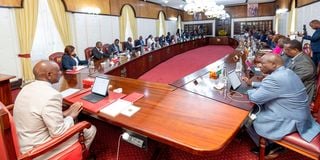Cabinet orders Energy ministry to split power transmission to end nationwide blackouts

President William Ruto chairs a past Cabinet meeting at State House in Nairobi.
The Cabinet has ordered the unbundling of the electricity transmission system to ensure that a blackout in one part of the country does not plunge the whole country into darkness.
In doing so, the government hopes to address the loss of bulk in transmission lines that leads to nationwide blackouts.
To address the overloading of transmission lines that causes blackouts, the Cabinet approved the construction of the Bomet-Narok line with €250 million (Sh37.5 billion) from the African Development Bank.
Funded in 2016, the transmission line was never completed due to legal disputes.
In addition, a $57 million (Sh8.55 billion) KenGen solar power project at the Seven Forks Dam will provide a hedge against power outages, the Cabinet said.
Additionally, a €1.2 billion (KSh200 billion) KenGen solar power project at the Seven Forks Dam will provide a hedge against power outages. The Kamburu solar power project will cost $57 million (Sh8.55 billion).
The 42MW project, the government says, has a huge battery storage facility that can be used when the power fails.
In addition, the government says the project will help conserve hydropower at the five dams that make up the Seven Forks.
President William Ruto, who chaired the meeting, observed that frequent power outages were hurting the country’s investment profile.
The country has in nine months witnessed numerous nationwide power blackouts, with the latest sparking a furore.
Acknowledged the disruption of electricity supply
In a statement, Kenya Power on Sunday acknowledged the disruption of electricity supply to various parts of the country as it assured that power would be restored "within the shortest time possible”.
The utility firm is the country's sole electricity distributor, and most of its power comes from the Kenya Electricity Generating Company (KenGen).
The Sunday power outage was preceded by another on November 11.
At the same time, the cabinet was informed that negotiations on the Kenya-European Union Economic Partnership agreement had been completed –and is expected to be signed next week.
For ratification, the agreement that will give Kenya more access to the European Union market will also be taken to Parliament.
The agreement has been in the offing, with the negotiations having started in 2002. In 2016, efforts to have the East African Community countries sign together failed.
Furthermore, the Cabinet was also informed that Comesa has once again extended Kenya's sugar import quotas, which were ending this year. This is the last time, however, that the extension has been granted.





